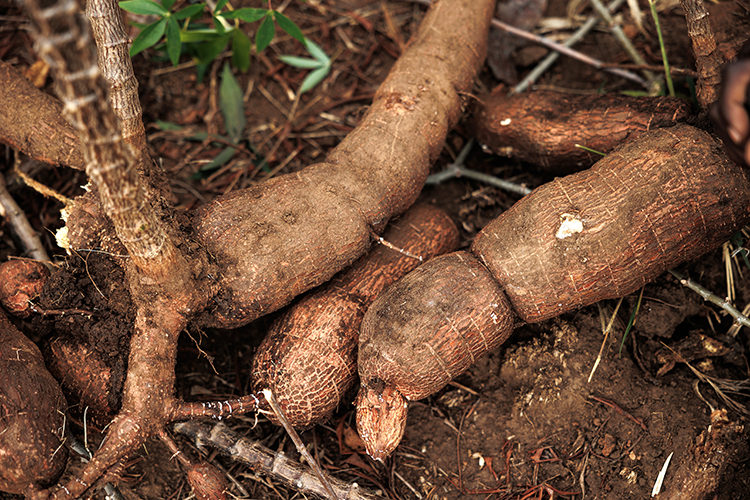
Collaborative Effort Seeks to Develop Resilient Cassava Varieties, Implement Sustainable Solutions for Smallholder Farmers in Sub-Saharan Africa
St. Louis, Mo. (12 December 2024) — In a pivotal effort to combat the cassava whitefly pest, an international collaboration of research institutions, agricultural innovators and development organizations has united to protect cassava yields in support of millions of African farmers.
To tackle the pressing challenges facing cassava—a staple crop for over 800 million people in tropical regions around the world—Uganda's National Agricultural Research Organization (NARO), the Donald Danforth Plant Science Center, the Hebrew University of Jerusalem's Tech Transfer Company (Yissum), researchers from the Hebrew University, and the Natural Resources Institute (NRI) at the University of Greenwich, have partnered with Bill & Melinda Gates Agricultural Innovations (Gates Ag One). Together, they are working to secure the future of this vital crop and the communities that depend on it.
‘Cassava is more than a crop; it’s a cornerstone of resilience across Africa, and in Uganda, it is the second most-produced and consumed staple food after bananas,’ said Dr. Titus Alicai, Director of Research at NARO’s Crops Resources Research Institute. ‘Its ability to thrive in poor soils and withstand drought makes it a lifeline and a critical insurance crop for millions. Cassava faces growing threats from pests like the cassava whitefly, which damages crops directly and spreads viral diseases that can wipe out yields. By advancing innovative solutions to protect cassava, we can help safeguard food security and livelihoods across the continent.’
Whiteflies are highly prevalent in certain regions of Africa and continue to spread into new areas. They feed directly on the phloem sap of cassava leaves, depleting the plant's nutrients and excreting honeydew, which promotes the growth of sooty mold on the leaves. This mold interferes with photosynthesis, further weakening the plant. The physical damage to plants from whiteflies can result in over 50% yield loss.

Whiteflies also spread two viral diseases—Cassava Mosaic Disease and Cassava Brown Streak Disease—the latter of which can cause total yield loss, placing smallholder farmers who rely on cassava for their income and food security in a precarious situation.
Scientists and practitioners in the field emphasize the importance of finding effective and sustainable solutions to combat this growing threat.
‘Research has shown that traditional control methods for cassava whitefly have often proven to be limited in their effectiveness, costly, or detrimental to the environment,’ said Dr. Nigel Taylor, Dorothy J. King Distinguished Investigator at the Danforth Center. ‘This collaboration represents a major, replicable advancement towards developing scalable and sustainable solutions.’
In Africa, where more than 40% of people rely on cassava as a source of calories, cassava serves as a "famine-reserve crop," with roots that can stay underground for years until needed to sustain people during times of scarcity and climate challenges.
The wide range of uses of cassava, with its edible roots and leaves—as well as its low cost to produce—make the crop attractive and essential for many enterprising smallholder farmers, particularly women.
‘The Cassava Whitefly Control project has the potential to benefit millions of smallholder farmers in sub-Saharan Africa, improving livelihoods by reducing yield losses,’ said Dr. Ilya Pittel, Vice President of Business Development at Yissum.
The project also seeks to ensure that smallholder farmers will have access to new agricultural innovations that too often bypass their needs.
‘Access to the latest generation of improved lines and planting materials remains out of reach for many farmers in sub-Saharan Africa,’ said Prof. Sheryl Hendriks, Director of NRI. ‘Together, we aspire to create opportunities that ensure every farmer can benefit from modern agricultural innovations.’
The consortium underscores both the opportunities and challenges in scaling modern agricultural solutions to reach smallholder farmers.
‘The partners involved in the Cassava Whitefly Control project bring specific expertise and experience to the table to tackle the devastating losses that the whitefly can cause for smallholder farmers,’ said Joe Cornelius, CEO of Gates Ag One. ‘We're immensely proud to be partnering with them and encouraging collaborations to address this issue at scale.’
About NRI:
The Natural Resources Institute (NRI) is a specialist research, development and education institute of the University of Greenwich, focusing on food, agriculture, environment, and sustainable livelihoods. An established global leader in research, teaching and innovation, NRI collaborates with partners across sectors and disciplines to co-create environmental resilience, sustainable agriculture, health and food security. NRI works towards a just world free from disease, hunger, poverty and violence. Learn more at nri.org
About Gates Ag One:
Bill & Melinda Gates Agricultural Innovations (Gates Ag One) is a non-profit organization that accelerates breakthrough agricultural research to meet the urgent and neglected needs of smallholder farmers in sub-Saharan Africa and South Asia. Out of the conviction that all lives have equal value, Gates Ag One serves the interests of smallholder farmers, who are most exposed to climate shocks yet lack the access that others have to the latest agricultural innovations. Gates Ag One works to level the playing field and empower smallholder farmers to transform their agricultural productivity, nutrition security and climate resilience. Learn more at gatesagone.org.
Contact:

